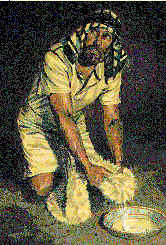How are you formed?
Here are just two ways God can form us.
See this video of a potter. At the start, the clay is just a lump. Not much to look at, little beauty, non functional, and undeveloped. Yet, because of its quality of malleability, it can be fashioned, sometimes rather quickly, into a masterpiece. A lovely, useful, handmade, creation, worth much more than an untouched lump of clay.
When the raw material is harder, more force is needed to change its form. See this case in metal working. But, remember, hammering the metal into form is most often preceded by a time in fire to soften it.
We fall into both of these categories as we develop. We have metal areas, and clay areas that need work. Which do you have more of?
God employs his Holy Spirit in whatever methods and processes are needed for that particular area of our lives. Often we need to be more softened and flexible before we are ready. For our own good, and for the good of others, God fashions us. To a certain degree we can choose the kind of raw material we give to God to recreate. When we present our hearts and minds willingly, the process of forming us into something very beautiful is a less painful and vigorous process. Sometimes, we have already presented ourselves willingly, and the suffering comes, regardless.
However, the less we surrender to the skillful, creative, loving work of God, the more time we’ll need in “the fire” to purify, refine, and prepare ourselves. In the end, God makes us so beautiful that we may hardly be recognizable.
When you are in times of great struggle, keep the end in mind. No two people will be formed in the same way. And, no trail is wasted. Our change is in the process, and our hope is in God’s final product.
It the area of “Spiritual Formation” (also called, discipleship) we may intentionally undergo practices that nurture Christ-likeness. We encounter a series of little deaths in devotion to the process at hand. We relent.
Should we be weak like wet clay, and not strong like iron? Some of that is not up to us, and much depends on how we will be used by God. If we try to be rigid like metal, God will take our kinks out, and knock of the useless parts. It’s not possible to apply a bit of hand pressure to metal, like it is to a spinning mound of clay. God may employ a mallet to get the job done. The job still needs to be done, no matter the process. God will have his way, so that we can be recreated. The longer we are rigid, the longer the process takes, even for clay.
Here’s the part I missed in my spiritual formation, until recent times: God is Good, and trustworthy. There was such a string of woe in my life, that I took God for a menace, or very drowsy. In gaining experiential, devotional, and formal training about God (which is the study of God, i.e.theology), I changed.
In a greater way, I know that though my heart may be battered, it will not be reshaped by a malicious God. The Supreme Being does not cause or let us endure suffering out of sport, or sadistic kicks.
How we see our struggles, the pain in this world (and God’s part in it (or absence in it, if the case may be), has everything to do with who we REALLY think God is, and what we REALLY believe about his core nature. Many times we attach human characteristics to God. Flawed ones. Please don’t forget this part: Those foundational beliefs we have, tell us about ourselves; and are inaccurate about God.
As in the case of Jesus (God with skin on), we see a deeply compassionate image of the Divine. An accurate image. We see amaze grace and self-sacrafice. We see God caring for us, and caring for us well. A gaze at God’s abundant creation will tell us the same thing. So, this is the true picture/reflection of God. He may let us get a pounding, but we will not be hammered in vain. Here, my friends, is our Hope.
So, imagine the best and ideal parent. (Mind, this won’t be anyone you know. This parent is not possible, in human form.) As a loving parent looks at a helpless baby, the good parent feels a sense of great responsibility and deep compassion. The idea to hurt the baby is nowhere to be found. Non existent. It is in this type of love and compassion that we are forged or molded. (Often in the Bible this is word love and compassion is translated, in English, to “loving-kindness” or “tender mercies”.)
Reflect-
1. What has been an area of clay that God has shaped in your life?
2. What is an area of metal that God is working on in your life?
Receiving Your Thoughts-
What stood out to you in the videos?
What do you have to contribute to thoughts about the process of sanctification? (Or, tell us your thoughts about how God helps us to mature and grow?)




